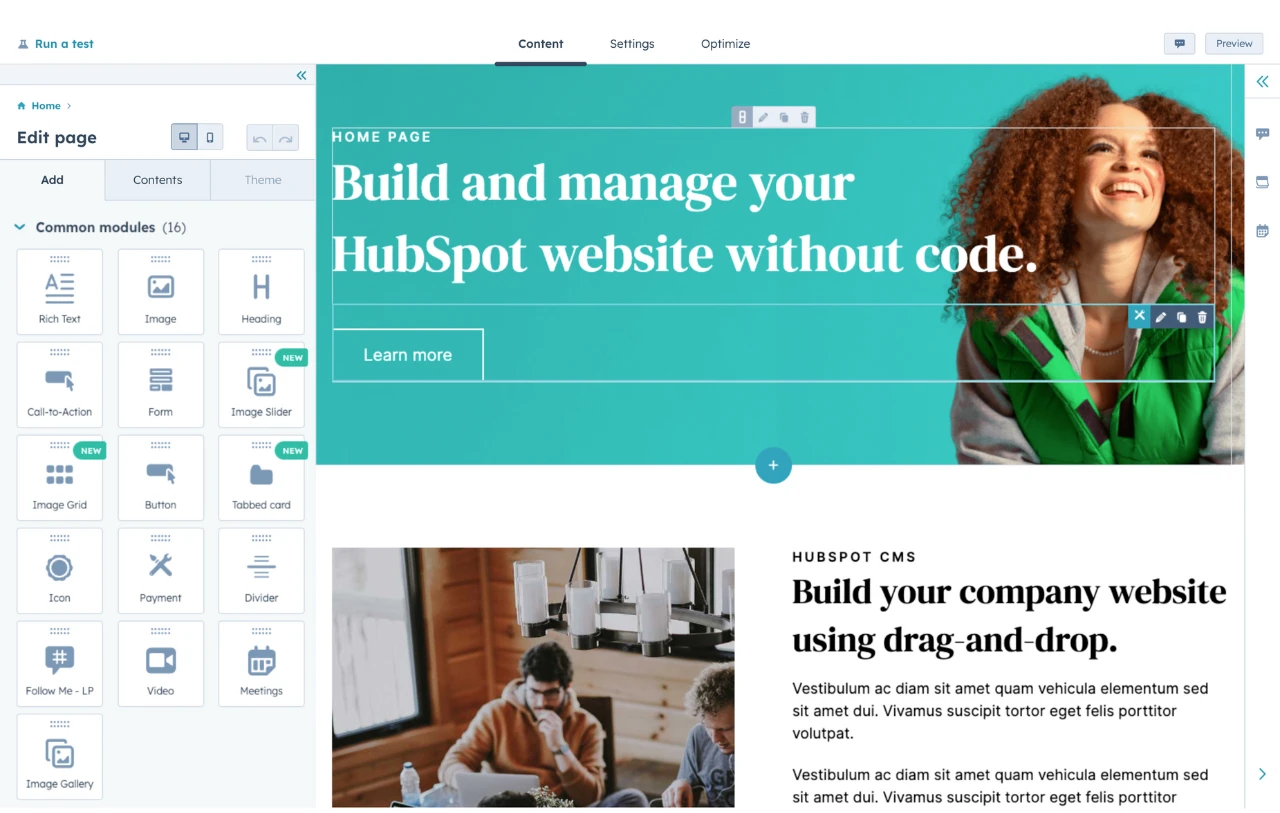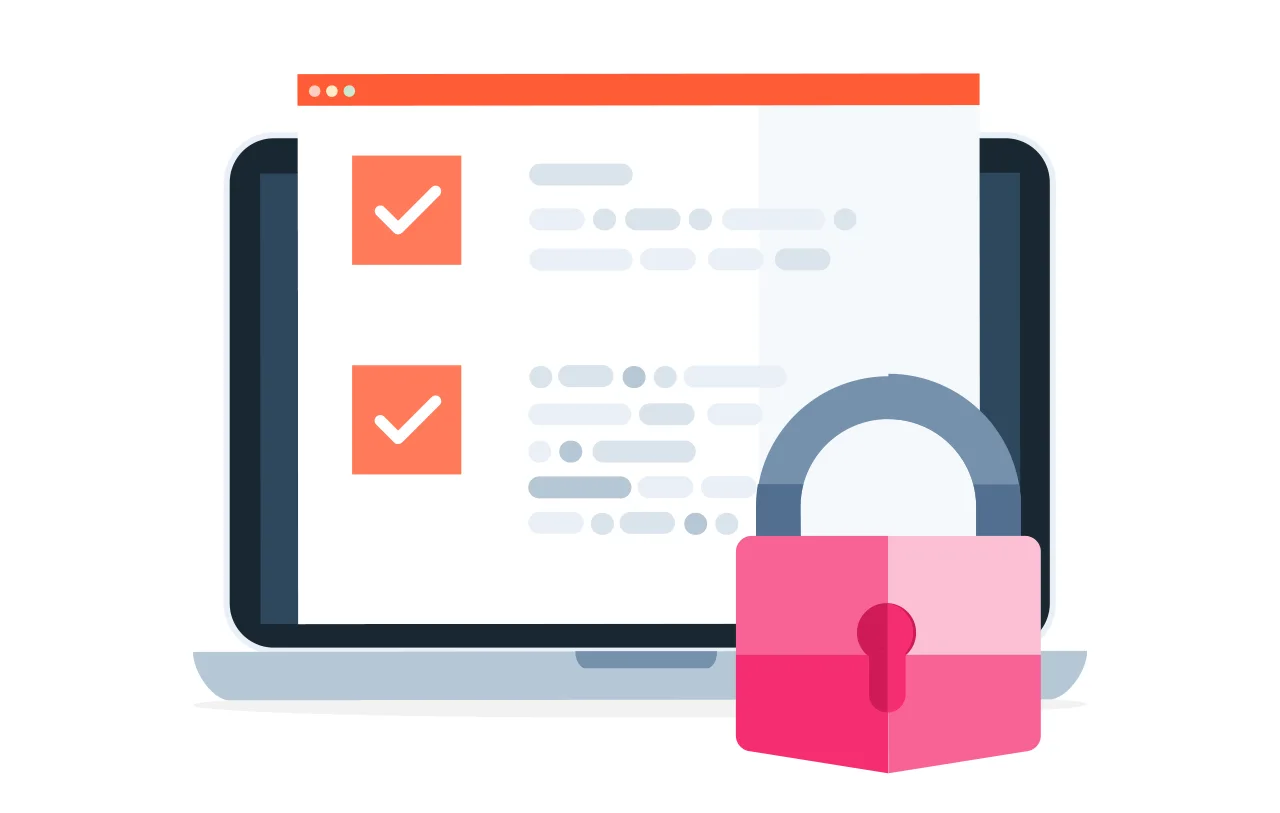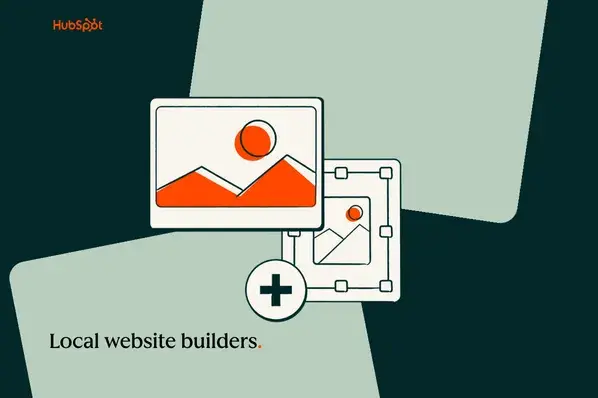Most companies hire freelancers to create sites, hire an agency, or take a DIY approach. This post will focus on the DIY route since it’s the most affordable option. Let's get started.
According to WebFX, the average cost of building a site ranges from $12,000 to $150,000, and the average cost of maintaining one ranges from $400 to $60,000 per year.
Yes, that’s a large range. Your website price depends on who builds your site, what type of site you’re building, what hosting service you choose, and what templates and extensions you add.
For instance, you can build a website for free using a platform such as Wix, Appy Pie Website, Weebly, or HubSpot CMS. However, depending on which option you select, you may need to remove third-party ads from your site and connect a custom domain. To do this, you’ll have to upgrade to one of their premium plans. (And yes, it really is worth investing in a custom domain connection.)
To help you more closely estimate the cost of the site you want to build, we’ll walk through the major expenses of building and managing a website.
Here's a table that outlines these expenses that you can reference throughout the process of site creation. Click on any of the website features in the left column to skip to that section of the post.
| Website Features | Cost |
| Software | $0 to $25,000 per month. |
| Web Hosting | $3 to $400 per month |
| Domain Registration | $3 to $25 per year |
| SSL Certificate | $0 to $250 per year |
| Design Pricing | $0 to $200 |
| Extensions | $0 to $200 per extension |
| Maintenance | $400 to $60,000 per year |
| TOTAL: | $439 to $365,475 per year |
Software Costs
The first and most important choice you’ll have to make is whether to use open-source software, like WordPress, or proprietary software, like Content Hub. (If you’re just getting started, you can consider using Content Hub for free to test the waters.)
So what’s the difference between open-source and proprietary software? Open-source is completely free to download, but you’ll have to account for other costs, including hosting, which you’ll purchase from a third-party provider, and SSL certification. It’s also possible that you’ll need to purchase additional tools to help you secure, update, and maintain your site.
On the contrary, if you opt for proprietary software, you won’t have to worry about hosting or the security, performance, and uptime of your site. You’ll just pay one monthly fee for a fully managed service.
The cost of using proprietary software varies considerably. While a proprietary website builder like Wix starts at $16 per month, Content Hub Professional starts at $360 per month. Enterprise content management systems are more expensive. Content Hub Enterprise, for example, starts at $1200 per month.
Pro Tip: If you’re in the market for a low-maintenance option, proprietary software will quickly prove worthwhile.
Total cost for software: $0 to $25,000 per month
Web Hosting Costs
Web hosting is included with proprietary software, so you only have to factor in hosting costs if you opt for an open-source solution, or if you're building your site from scratch.
Most providers offer various types of hosting services, including shared, managed, VPS, and dedicated hosting. These offer several distinct features and range from about $3 to $400 per month. Shared hosting is the most affordable option since you share a server with multiple websites, while dedicated hosting is the most expensive because you get your own server. On the other hand, when you buy a VPS server, your costs will increase a little bit as this a virtual server that offers you more performance and security as compared to the shared hosting. Or, you can begin with Content Hub hosting, which is available for free.
If you’re unsure whether shared or dedicated web hosting is the right option for you, consider how much traffic your site gets per month and how much you’re willing to invest.
Let’s look at a specific example to help narrow down that range. Say you choose to create your site on WordPress.org. You’re a small business looking to get your site up and running as quickly as possible. You could sign up for Bluehost’s Starter plan for $2.95 a month, which supports 15,000 visits per month a free SSL certificate and domain name included for the first year.
Pro Tip: If you don’t get substantial traffic or you’re looking to keep costs down, start with shared and work your way up. If your site constantly is bombarded with traffic, however, a dedicated server is worth the investment to ensure it won’t crash.

Total cost for web hosting: $3 to $400 per month
Domain Registration Costs
Regardless of how you host your website, a domain name is a must-have. Because your domain serves as your website’s Internet address, it’s a crucial part of establishing your unique digital presence. By picking a domain name that matches your company name, you’ll strengthen your brand identity and make the site seem more professional.
Virtually all hosted and self-hosted platforms include domain name registration in their sign-up process. Some platforms like Squarespace, as well as third-party hosting providers like Bluehost, include a free year of domain registration when you sign up for a plan. Other hosted platforms like Content Hub and providers like SiteGround require you to purchase a domain from a third-party domain registrar like GoDaddy or Namecheap. You can then easily connect it to your account.
Pro Tip: If you need help choosing your domain name, check out our comprehensive guide to domain name selection.
Let's take a look at the average cost of a domain name below.
Average Cost of a Domain Name
Generally, registering and renewing a custom domain costs around $12 per year — but the price can vary depending on a range of factors. Here is the website management cost associated with your domain name:
- Domain registrar: Domain registrars range in pricing, depending on the available domain names, privacy, reputation, and expiration fees they offer. Domain.com, for example, offers domain registration for as low as $2.99 annually and most .com domains for $9.99 annually. This makes it one of the most cost-effective options. Other best domain registrars include Namecheap, Name.com, and BlueHost.
- Domain extensions: Domain extensions impact the overall cost of your custom domain. The extension .com, for example, is the most popular and therefore more expensive. It typically costs between $12 and $15. Less popular extensions like .site, and .biz are typically less expensive and cost between $7 and $11. You can check out GoDaddy’s pricing for different extensions below.

- Domain privacy and protection: When purchasing a domain name, there’s the option to add domain privacy and protection. This prevents your personal information (including your name, address, phone number, and email) from being listed in the public WHOIS database for anyone to search and view. It’s a worthwhile addition as it helps reduce the likelihood of threats and attacks on your website. Domain privacy and protection typically costs around $10 per year.
- Term of registration: When purchasing a domain, you can select how long you want to register your domain. Setting it for one year will allow you to pay the least amount up front, but some registrars offer a discount for multi-year terms. This option is especially appealing if you don’t want to have to remember to renew your domain yearly.
Pro Tip: While certain domain extensions aside from .com or .org cost less per year, you may be sacrificing credibility for cost. Keep in mind that visitors are comfortable visiting .com and .org sites, and may think twice about visiting a .biz site.
Total cost for domain: $0 to $25 per year
Soware SSL Certificate Costs
An SSL certificate is a standard security technology that secures information between a visitor’s browser and your website. It’s an essential addition because it ensures that sensitive information like passwords and payment information remains private.
Fortunately, many hosted platforms including Content Hub offer an SSL certificate in your plan. If you opt for a self-hosted platform, many hosting providers also include an SSL in their plans. HostGator, for example, even features an SSL certificate in its lowest-tiered plans.

If your hosting provider does not provide SSL, you’ll need to purchase one from an SSL certificate provider. There are several providers that offer free SSL certificates, but most range from $7 to $250 per year.
Pro Tip: Your visitors will also expect your site to be encrypted with SSL for their protection, so be sure that your site has a certification to meet their expectations.
Take a look at the pricing of the SSL certificates offered by Network Solutions below.

Total cost for SSL certificate: $0 to $250 per year
Website Design Pricing
Many website builders and CMS platforms come with free templates that you can customize using a drag-and-drop editor. Thanks to these easy-to-use editors, you can quickly change the appearance of your site without needing to design it from scratch — and without learning how to code.
Some platforms offer a more limited selection than others. In that case, you might have to purchase a premium template to get the exact look you want.
Take Shopify, for example. While there are nine free themes, if you want a more personalized look that allows your ecommerce business to stand out, you may opt for a premium theme, which ranges in price from $200 to $350.
Pro Tip: If you really want your website to shine, you can work with a designer to create a completely unique site. However, that comes at a cost.

Total cost for site design: $0 to $350
Extensions Costs
With most platforms, you’re not limited to the features provided out-of-the-box. You can download or purchase extensions to add functionality to your site.
As mentioned above, the selection of extensions varies drastically from platform to platform. For example, WordPress has over 60,000 free plugins available in its official directory alone. That means there's a WordPress plugin for virtually anything you can imagine, whether it's adding forms and live chat to your website, optimizing your blog's SEO, or adding event listings directly to your site.
Joomla, on the other hand, has around 5,900. Magento has in the thousands.
The other 2,500 extensions in Magento’s marketplace range in price from $25 to $15,000 (!). While most extensions fall within a much smaller range, they can add up.
Let’s say you create your site on a platform that doesn’t have built-in SEO or social media tools. In that case, you might sign up for a premium keyword research tool like Semrush with plans starting at $119.95 per month. You might also sign up for Hootsuite to schedule your posts on Facebook, Twitter, and other social media sites. That’ll cost you $49 per month for a single-user account.
You’re already looking at over $165 per month and we haven’t even gotten to other features you might need to help with lead generation, analytics and reporting, and more.
Pro Tip: To cut down on your costs, look for a platform with robust built-in functionality. Content Hub, for example, offers comes with many HubSpot tools out-of-the-box so you don’t have to integrate with a bunch of third-party software. Plus, you won’t have to transfer your data into your CRM — it will already be there.

Total cost for extensions: $0 to $200 for each
When budgeting how much it costs to maintain a site, it’s helpful to categorize your expenses into monthly, annual, and one-time fees.
Domain renewal, for example, is an annual fee. Same goes for SSL certification.
For software or hosting plans, you can usually decide whether to pay for the plan for the whole year or break it up into monthly installments. Most providers offer a discounted rate if you pay for the year upfront, so while it’s more costly to get started, you’ll save money in the long run.
There are also some one-time fees associated with website maintenance to account for in your budget.
The biggest is a website redesign. If you're looking to simply rebrand your website, then you might just need to update your theme. However, there are some situations where a more extensive refresh may be warranted. Some website-building platforms are flexible enough to let you add custom CSS and HTML to templates and even build pages from scratch.
If your platform isn’t, you might have to purchase another theme,hire a freelancer, or work with an agency, which can get pricey. We're talking hundreds or tens of thousands of dollars pricey. If you want to learn more about the numbers associated with completing a website refresh, check out this article.
If you're looking to change the functionality as well as the appearance of your site, however, then you'll likely to have to download or purchase additional extensions. Say you want to improve your website performance, for example. If you're using WordPress to power your site, then you might just need to install a caching plugin.
If there's no such extension available for the website building platform you're using, or you need help identifying what's causing your site to lag and a more custom solution, then likely hire someone to fix it. That can cost another few hundred or thousand dollars.
Pro Tip: At some point, your website is going to need a redesign. Generally speaking, it’s wise to redesign your site every two or three years. If you don’t want it to be costly, consider how easy it is to rework your site when selecting your site-building platform.
Total cost for website maintenance: $400 to $60,000 per year
Estimate Your Site Building and Website Management Cost
With so many different ways to build a website, predicting the cost of building a site is difficult. It’s even harder to guess the website management cost. If we add up all our estimated costs for a grand total, you could spend anywhere from $439 to $365,475 per year building and maintaining a website.
Figuring out which type of platform will best meet your needs and goals will give you a much clearer idea of what your site might cost. If you opt for a self-hosted platform, calculate the costs of a hosting provider and plan, domain name, SSL certificate, theme, and extensions that might suit your site.
Alternatively, you can opt for a robust and fully hosted CMS that gives you everything you need, like Content Hub. Regardless of what you select, be sure to accurately factor in the costs of building and maintaining a site into your budget so there are no surprises.
Editor's note: This post was originally published in February 2020 and has been updated for comprehensiveness.
Website Development








![How to make a website with user accounts and profiles [with WordPress, Wix, and more]](https://53.fs1.hubspotusercontent-na1.net/hubfs/53/%5BUse%20(3).webp)
![How to build a Google Site that looks good and drives business [templates & examples]](https://53.fs1.hubspotusercontent-na1.net/hubfs/53/Website%20Redesign%20Terms.png)




